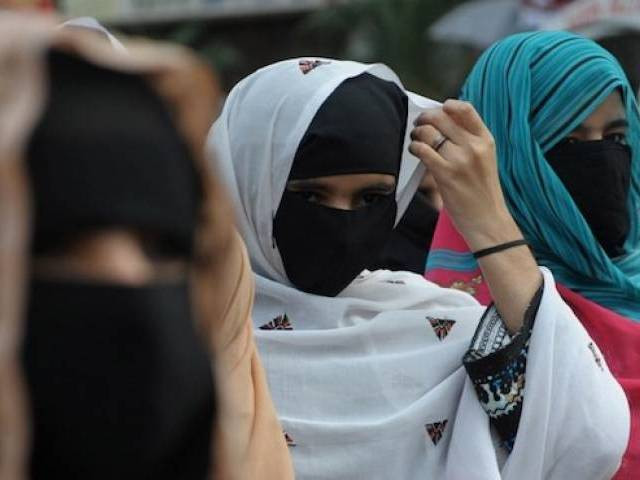Women’s Day: Activist sceptical of efficacy of new law against violence
Says she believes it is an attempt to present a softer image of the country to the outside world

PHOTO: AFP
She was speaking at Her-storical Narrative of the Women’s Movement in Pakistan. The event was held to mark the International Working Women’s Day.
“How can someone who had tried to establish a caliphate in the country just 15 years ago become secular?” she asked. Said, a founding member of the Women Action Forum, said she believed the enactment of the law was an attempt to present a soft image of the country to the outside world. It had been enacted without consideration of its implications, she added.
Said said most crisis management centres proposed under the law would be set up in far-flung areas. She said the law would be ineffective in curbing incidents of violence as most women would be unable to access these centres.
Said was also not convinced of the Girls at Dhabbas’s role in the women’s movement. She said such groups spoke for and appealed to women only from a particular economic class.
“At least women are coming together on these forums. That’s encouraging,” she said. She added that such groups would be more effective if they connected with women from a cross-section of society. “They won’t achieve much if they restrict their activities to their own bubble,” she said.
Earlier, Said discussed the history of the women’s movement in the region. She said the women’s movement could not be summed up in the activities of a single organisation.
She said Pakistani women had been trying to create space for themselves in various spheres of life.
She said the first wave of feminist activism was usually associated with the early 20th century struggles for suffrage led by women in western countries. However, she said that at around the same time period similar struggles were underway in the Indian subcontinent as well.
She said women in the region had played an active role in struggle for freedom from the British raj as well as in communist and peasant movements. She said in some of these movements women even took up leadership positions.
“The first Pakistani flag hoisted in Lahore had been cut out from the dupatta worn by a schoolgirl participating in a pro-freedom rally in front of the Civil Secretariat building,” she said.
The first Pakistani delegation to the United Nations in 1947 had included a woman.
Recalling early years of the country, she said that women could seek employment in all state institutions except for the Armed Forces. She said women enjoyed greater freedoms in those days. These freedoms were curtailed during General Ziaul Haq’s government by restricting women’s mobility and enforcing dress codes and by enactment of the Hudood Ordinances.
She said it had become difficult for women to access the public space. “Women had to keep their marriage deed with them all the time to avoid distress. Anyone could call them out for not observing the dress code defined by the Zia regime,” she said.
There was backlash from women to these oppressive tactics. She said that by pushing women against the wall the Zia regime had indirectly helped the women’s movement. A large number of women had taken to the streets to oppose the Zia government.
She said that during his first term as prime minister, Nawaz Sharif had continued in the footsteps of General Zia. “His government had discriminated against non-government organisations working for women’s rights,” she said.
Published in The Express Tribune, March 7th, 2016.



















COMMENTS
Comments are moderated and generally will be posted if they are on-topic and not abusive.
For more information, please see our Comments FAQ